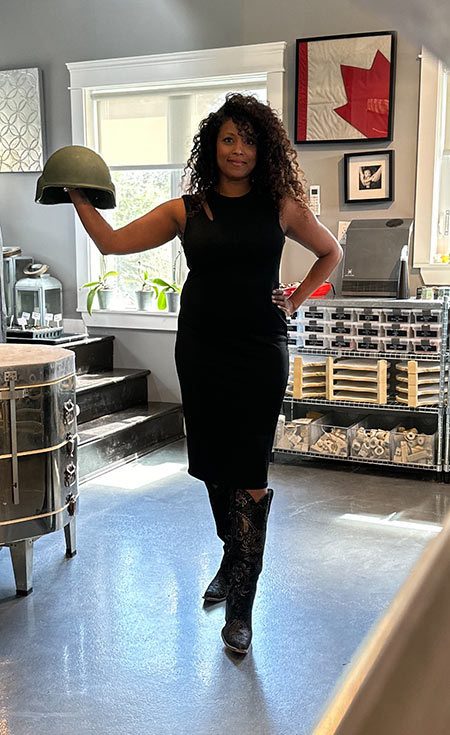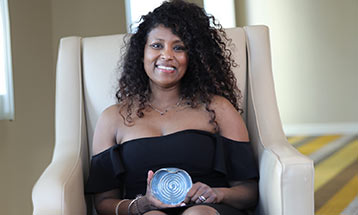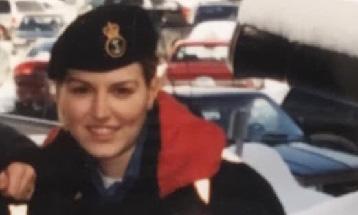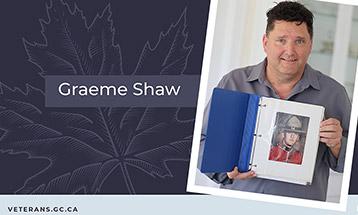Lynette Peters, a ceramicist, military spouse and PhD health candidate at Halifax’s Dalhousie University, operates a ceramics studio near Lawrencetown Beach, Nova Scotia. This is where she gives Veterans free opportunities to express their creativity in the experience of the clay arts.
“It’s hard to manage big emotions. Emotion isn’t something that we have forever — it fleets. And we can change that emotion when we do things together. I think art does that for us,” she said. “Art and craft are not only occupations, but excellent distractions.”
Peters’ area of research is unique. She’s interested in understanding what it means for Canadian Armed Forces (CAF) Veterans to have access to the clay arts during their military to civilian transition period.
The 43-year-old mother of five started the Cerberus Helmet Project (named after the three-headed hound at the gates of Hell in Greek mythology). She uses decommissioned military helmets as pottery moulds— and she says this gives them new purpose and in a way—by honouring the individuals who wore them. Peters’ spouse, who was injured in Afghanistan, was very unwell when he medically released from the CAF in 2016. In this experience, she says she realized the potential value of craft for those in similar circumstances and she wanted to build a career in service to others.

“As a spouse to a Veteran who had seen combat and experienced things that were so awful, I watched him go through his transition. I could see what was hard for us and what we needed,” she said.
That’s when the idea for the helmet project germinated in her mind. Her husband was one of the first Veterans to make a clay bowl out of his old military helmet.
“(Today,) if somebody comes over, he'll talk about his helmet project. He chose to make it look like a helmet, but he doesn’t speak of it as a helmet. It’s a chip bowl, one day it’s a flower holder, one day it’s a medicine holder, another day a nut holder,” she explained.
“I’ve learned some really, really important things by watching people interact with art. I’m an artist and I like to teach art because I like the way pottery makes me feel. And I wanted to share that with other people.”
She estimates 85 per cent of the Veterans who have taken part in her helmet projects first tell her they are not creative. But by the time they leave they’ve expressed innate creativity.
“People come in and their guards are up. But it changes,” she said. “You see people listening and learning and getting more comfortable, their hands meet the clay. And then they start making and they see what’s emerging. You see the confidence starting to build. My studio is about the art and craft of clay, the artist-student craft-sharing dynamic, not art therapy, a vastly different concept. Many of the elements of craft and craftsmanship are similar to trades and trade-occupations. They both involve working with one’s hands.”
“We play with clay. I think we lose that as we become adults, the ability to play. And I think that through play, we learn a lot about ourselves and we learn a lot about our ability and what we can do.”
The most rewarding part of her work is when Veterans take their art projects home with them, many will continue to make art and send her pictures of their creations. She hopes her impact will leave them with a lasting love of art.
“Feed a man a fish, you feed him for a day; teach a man how to fish, and you feed him for a lifetime," she said.
“This is how I feel about my own personal purpose in life and what the work I choose to engage in means to me, and what I want to model for my children.”
Peters says she hopes to eventually have a gallery show displaying Veterans’ artistic creations contributing to her final dissertation in Fall 2025.
Right now, she says she is exactly where she wants and needs to be, making art, helping Veterans by sharing and providing access and working towards the generation of research that is authentic to her own unique life experience and purpose. Her research and studio are the first of their kind.
“All of the intersections of my life have met in one apex.”
Learn more: Lynette Peters - Shaping the Future (YouTube)
If you or someone you know is transitioning to life after service, check our website for services related to mental and physical health, finances, education and jobs and housing and home life. We also provide services to families and caregivers who support our Veterans.



